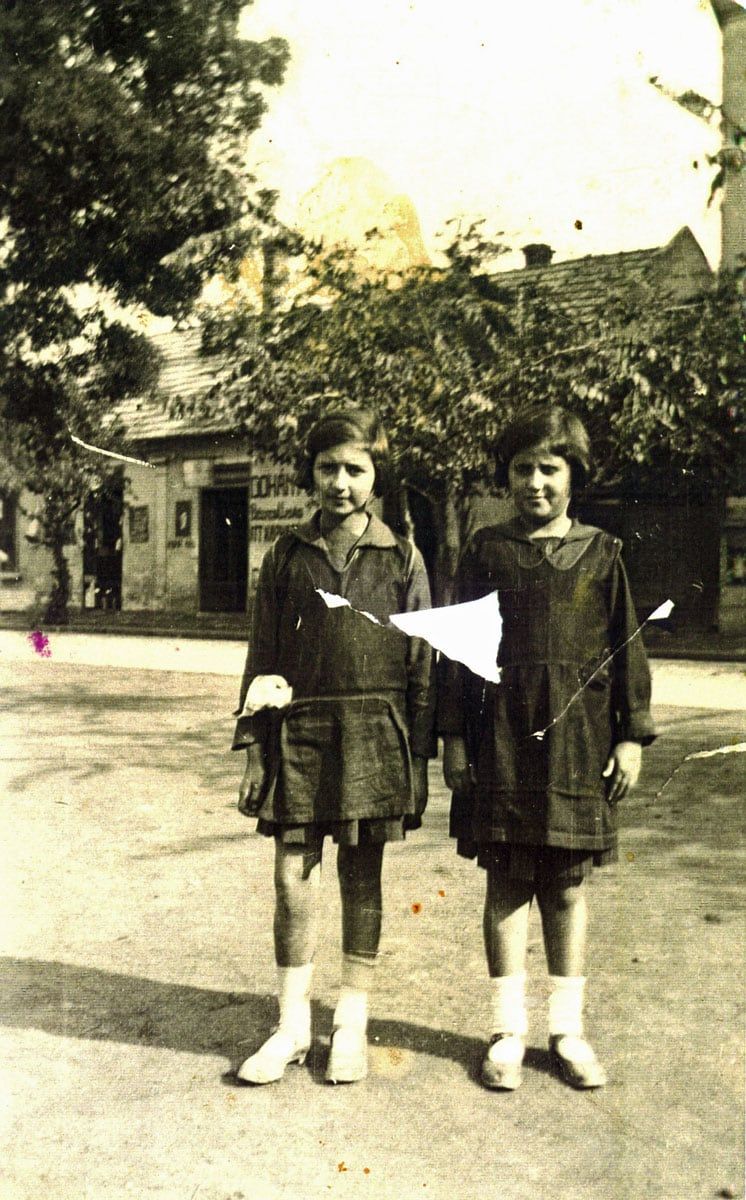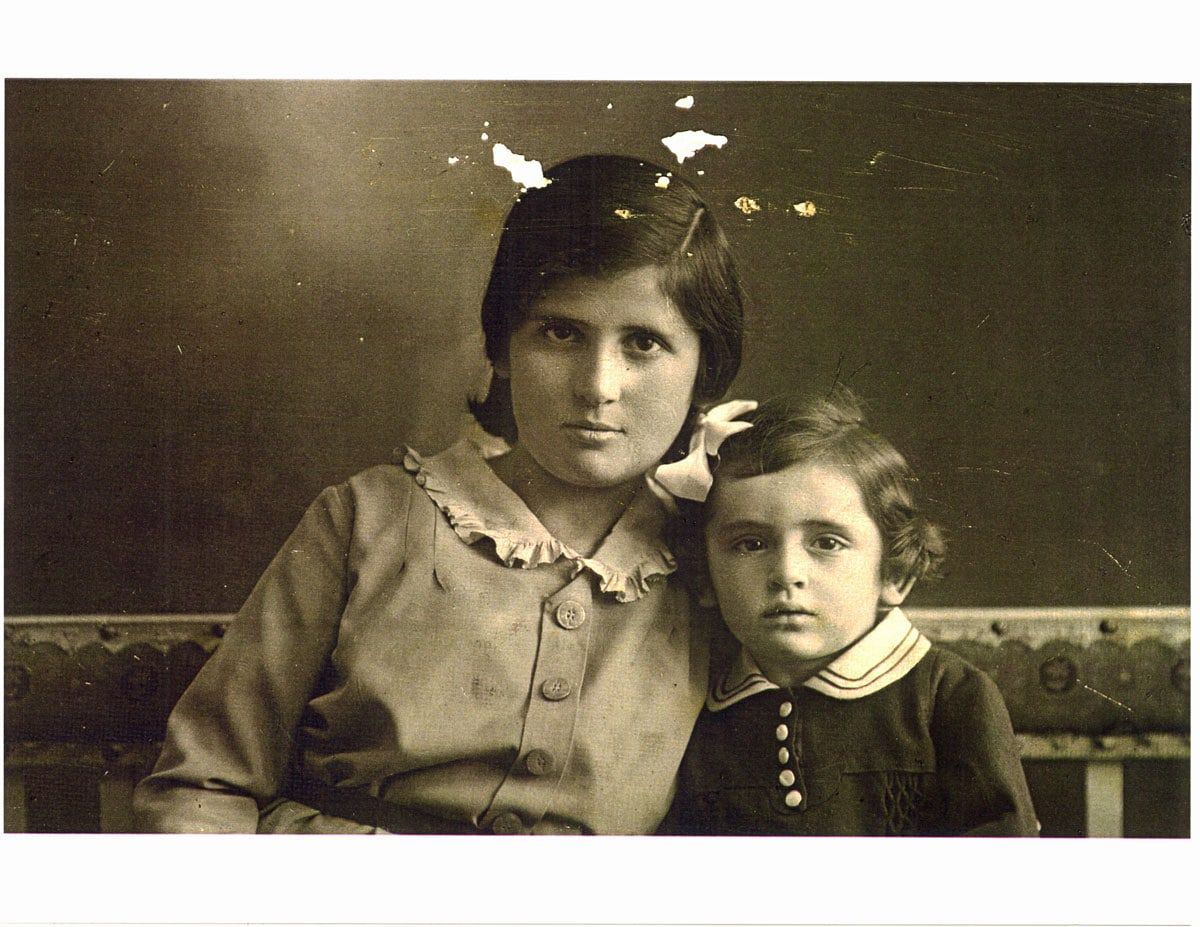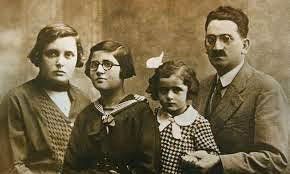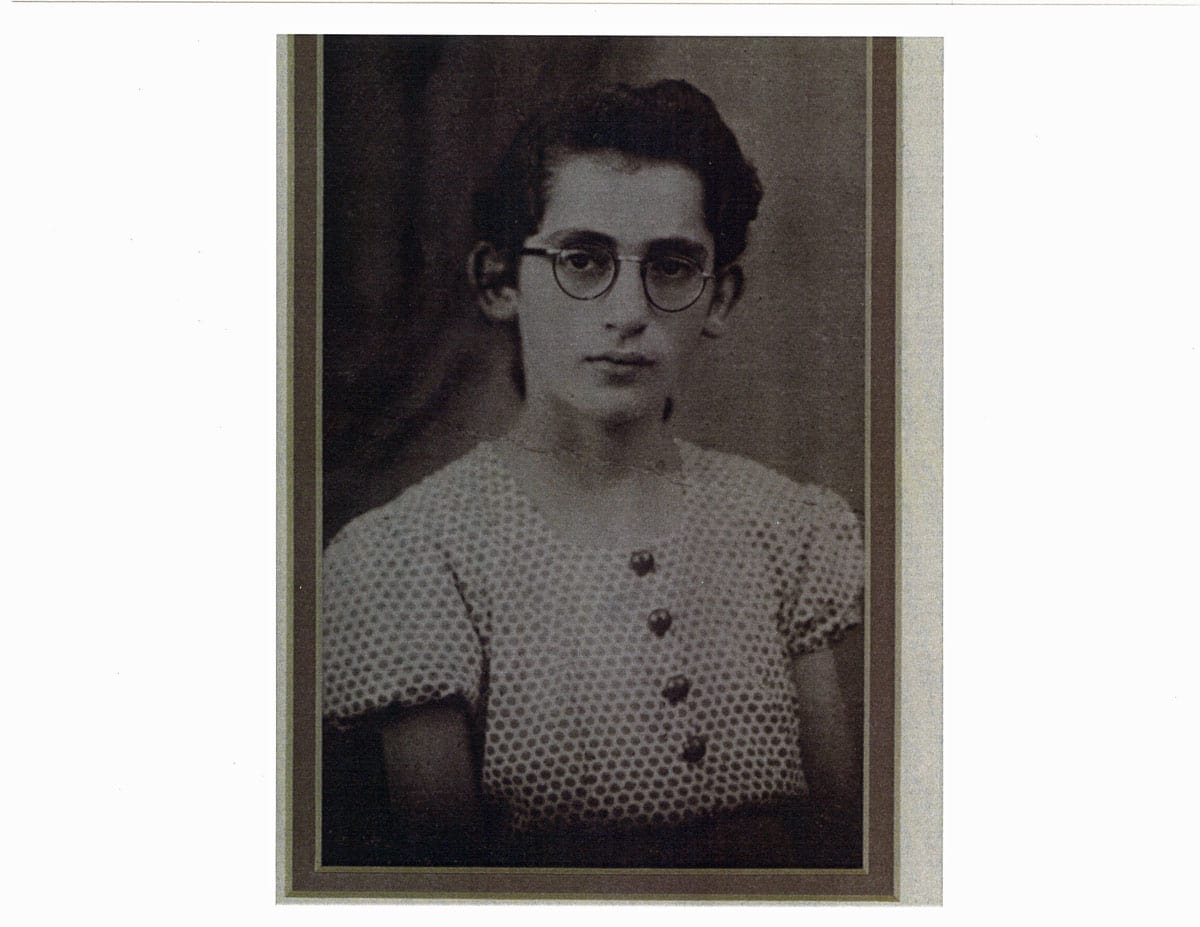The Backstory: Noemi’s Early Life
1922–1932
I was born on September 29, 1922—exactly nine months after my parents married. My mom had decided that if she gave birth to a girl, she would choose the name Noémi, a character in a book written by the famous Hungarian author Mór Jókai. Jewish babies receive a Hebrew name, so my parents choose Naomi, the Hebrew version of Noémi. To help English-speakers learn to pronounce my name, I often share the trick of saying “No, Amy!” It’s that easy, especially because my Hungarian nickname, Émi, is also pronounced like the English name, Amy. I still thank my mother for giving me such a unique name, a name that means “my delight.” And I have no doubt that my mother was delighted to be a parent.
When I was born, my mom was still working for Rabbi Immanuel Löw, a kind man who was almost like a king in the Hungarian Jewish community. Having received permission to bring me to work, my mom sang aloud as she proudly carried me to her office each morning. My mother truly enjoyed working for the rabbi, but as bitterly cold weather descended over Szeged, she decided to resign and focus her attention on taking care of me. One thing I learned from my mom was the importance of figuring out where you are needed the most. She also taught me the value of paying close attention to your children when they are with you. That undivided attention was a gift my mother gave me every single day.
After living in Szeged for five years, my parents moved to Esztergom, a town in northern Hungary. Although I grew up speaking Hungarian, my parents wanted me to learn German so they enrolled me in a kindergarten classroom where we spoke German most of the day. In Europe it’s common for people to learn the language of neighboring countries, so Hungarians often learn German, the language of Austria.
The next year, we moved to Kiskunhalas, a small city in southern Hungary, where my father served as a teacher and headmaster at the local Jewish elementary school. We lived close to the only synagogue in town, in a neighborhood surrounded by other Jewish families. Soon after we moved, I met Erzsi, the rabbi’s daughter, who was visiting the nearby park with her parents. As Erzsi and I shyly looked at each other, I broke the ice, suggesting, “Let’s put sand in our underwear!” We both laughed as we covered ourselves in sand, until our gritty clothing became so uncomfortable that we begged our parents, who were chuckling at our antics, to allow us to go home and change. From that day forward, Erzsi and I were the best of friends. In those days, it seemed like I always had a reason to feel happy. If I received a pair of shoes for my birthday, I would put them on and dance for joy.
My father later described the fourteen years we spent in Kiskunhalas to be the happiest of his life. He appreciated the community’s friendliness and respect for the role of teachers in providing guidance for their most precious treasure, the children. My father, working in a combined role of fourth-grade teacher and school principal, made improvements at our small school, first arranging for indoor plumbing and running water, and then planting grass so we could have recess outside, and finally purchasing school furniture. When my father became my fourth-grade teacher, he took care not to favor me. Instead, he became unusually strict and required me to address him as Mr. Schönberger. I obeyed, but always with a knowing smile.
It became a tradition for me to help decorate my father’s classroom every year on his birthday. On the day of the celebration, I would discover the key to his room on the floor next to my bed and would then excitedly skip to school tightly grasping the key, aware that as soon as I opened my father’s classroom door, the other children and teachers would fill his room with wildflowers. My dad always acted like he was completely surprised. What a special day that was!
For most of my childhood, my parents spent about six weeks of the summer vacationing with some of my father’s teaching colleagues. We gathered what we needed and took a bus to the rustic cottage my parents had rented—a place for the adults to relax and the children to play. My parents always managed to find someone who had a piano for me to use, and never forgot to ask, “Émi, did you remember to practice today?” I loved playing the piano, but I admit that I didn’t always enjoy daily practice, especially when there were so many wonderful ways to pass the time during those special vacation days. My father loved hiking and climbing so we sometimes went trekking along the winding alpine trails that traversed the foothills of the Alps. Although it wasn’t a main attraction like swimming or playing with my friends, exploring the hillside trails was always an adventure. My favorite part of the vacation was swimming in the beautiful Danube River, especially when we traversed the waves created by the large ships traveling between Budapest and Vienna. I admit that sometimes in my excitement I got carried away and worried my parents by swimming too far from the shore. It was hard to resist diving through the magnificent swells created by those enormous ships!
Our families had an important rule on vacation—the teachers were not allowed to talk about work. Anyone who mentioned school was required to put a coin into a jar, and the children collected the money to buy ice cream. Of course, we all listened carefully, immediately pointing out adults who needed to toss in a coin. We had fun thinking of ways to trick the teachers into talking about their jobs, hoping for more ice cream. I have a feeling that the adults sometimes broke the rule just because they enjoyed seeing our delight with each added coin.
When I was nine years old, my parents shared the news that my mom was expecting a baby. Learning about our expanding family, someone in the school community loaned my father some money to buy materials to build a small house. Then another family offered a parcel of land and a third parent volunteered to draw up some building plans. With everyone working together, we were soon celebrating our move into a cozy house right by the school. My mother was especially delighted to have the luxury of two bedrooms and indoor plumbing. Just before my mom gave birth, my father rushed home from the military training he was required to attend each year, relieved he had received a three-day pass. My mom was waiting for him at the train station, and the next morning—August 2, 1931—my little sister, Erzsébet, was born.
I was excited to have a younger sister, and Erzsébet and I became very close. We were quite a pair. I had our mom’s petite stature, dark eyes, and wavy, jet-black hair, while Erzsébet was tall and slender with curly, brown hair like our father. Erzsébet’s glasses made her look quite serious, but she had a fantastic sense of humor. She always kept a straight face when telling jokes, and enjoyed making everyone laugh. Erzsébet learned quickly and had wisdom beyond her years. Since I was almost ten years older than Erzsébet, I was very much the big sister and someone who Erzsébet relied on. Erzsébet seemed to think that a big sister knows everything. She constantly asked for my advice, and often mentioned, “I want to be just like you, Émi.” Although we had a wonderful relationship, I must admit that we weren’t angels. We sometimes argued. That can happen when a big sister speaks frankly to a little sister and the little sister doesn’t like what the big sister is saying. But we loved and respected each other, and that’s what was most important. I have always told people that I had a beautiful childhood, full of memories that make me smile. From the very beginning of our lives, both Erzsébet and I were loved and well cared for. And we always felt safe and secure, at least until the day the Nazis came to Hungary.
We didn’t have a Jewish middle school in Kiskunhalas, so after we finished elementary school, my best friend Erzsi and I went to the public school managed by the local Protestant church. When it came time to study religion, everyone who was Jewish went to a separate room. We then attended our own religion classes at the synagogue every Sunday. I had many good friends who were Christians, and never felt that the other girls treated me differently because I was Jewish. They invited me to see their Christmas trees, and my family invited them to join us as we celebrated Hanukkah. We all celebrated our graduation from middle school without any religious boundaries.
My parents wanted me to attend high school, but the Jewish high school was only for boys. Determined to have my education continue, my parents found someone to tutor me, Erzsi, and two other Jewish girls. We worked hard and studied exactly what the boys were learning in their high school, then traveled to Budapest every few months to take the tests required for our high school diplomas. After completing my schoolwork and practicing the piano each day, I was allowed to spend time with friends. Although I never learned to ride a bicycle, I was able to take the streetcar or walk to most places I wanted to go. My friends and I sometimes joined some of the high school boys, listening to local concerts or academic presentations. Even in the cold of winter, we had fun ice-skating with some of the high school boys. After spending hours on the frozen lake, we happily feasted on freshly roasted chestnuts as we trudged home through the snow. I had the privilege of living an uncomplicated life, carrying no more than typical adolescent worries on my shoulders.
Of course, my life was not completely carefree. As with any family, if I didn’t do the chores, my mother and I might have some words, but the matter was handled with love. Like many teenagers, I remember feeling resentful if I heard “Émi do this” or “Émi do that” and was annoyed when it seemed like I was assigned the least interesting jobs around the house. Even in those days, teenagers had some strong opinions.
My Grandma Nina, a petite woman with a kind face and an easy smile, was a big part of my early years. My grandma thoroughly enjoyed life—and passed on that joy to her children and to me. She had a gorgeous singing voice, often cheerfully belting out a medley of her favorite songs as she lovingly tended the carefully organized rows of vegetables and flowers she planted in our yard. Grandma Nina enjoyed baking, and always had delicious smells coming from her kitchen. Even when she was too busy to bake, she placed apple peels on top of her wood stove, filling the air with the aroma of baked pies. I smile when I think of the wonderful food my grandma prepared, especially the special treats always awaiting me when I came to visit. I have to say that my grandma was an even better cook than my mom was, but I knew how to keep quiet and not comment on the differences.
Although Grandma Nina enjoyed spending time with family, she was a very independent woman and determined to live by herself. Because there were many times she didn’t feel well, we were thankful that her apartment was close by so we could easily check on her. I never knew exactly what caused my grandma’s sick spells, but when my mom whispered, “Émi, go get the doctor,” I frantically ran to find him. My mom was responsible for helping my grandma because none of her older brothers lived close by. Uncle Sándor was a teacher, and lived with his wife and their two children in the northern Hungarian city of Eger. Uncle Béla went to work in America after he finished college, and continued to live there after falling in love and getting married. Uncle Béla wasn’t able to visit Hungary often, so it was a big deal when he came to see us. I loved hearing his stories about life in America, and treasured a gift he brought me—a beautiful knit dress—that was especially precious because it came all the way from New York. Uncle József and his wife also moved to America, settling in New York, close to Uncle Béla. My mom’s only sister, Aunt Bözsi, lived in a nearby city where she worked as a secretary. My mom and grandma had been worried because Bözsi was slow to get married, but then she found a husband. Soon after, when I was my late teens, Aunt Bözsi and her husband welcomed a beautiful baby girl named Eva. When Eva was born, I stayed with them for a while, helping take care of the baby. I didn’t have a lot of experience with infants other than watching my mom care for Erzsébet, but I learned a lot caring for my little cousin.
I think a lot of my strength comes from this wonderful family base. Hungarian life didn’t involve a lot of chitchatting with the neighbors; we were inside our homes more than outside, and learned from inside the family rather than from friends. Children listened to their parents without hesitation and were grateful for a parent’s guidance, appreciating the knowledge that comes from tradition. We understood that we were learning not only from our parents, but also from our parents’ parents and even earlier generations. We recognized the importance of that wisdom. It’s interesting to sit back now and to see all of these things so clearly.
I learned a great deal by watching my parents. Their marriage was really something! They supported each other and had a strong connection. My dad had a high opinion of my mom so he shared everything with her and valued her judgment. They were true partners. They loved each other and their children. Of course, they each had their own opinions and way of thinking, but they respected each other and compromised. When they disagreed, they discussed their differences calmly and quietly.
My parents never preached to me, but I learned the difference between right and wrong by watching their actions and listening to their guidance. Growing up, I didn’t have a lot of rules. And when there was a “no,” it came from a place of love and the need for me to learn and grow. When I was young, my parents never said, “This is not for you,” from little things to the big things. They understood that we all face difficult times and that life doesn’t always have a storybook ending, where everything is easy or beautiful. My parents wanted me to learn to think independently and to face challenges without backing down. However, in those idyllic years, I’m sure they never imagined the challenges that they were preparing me to face.







